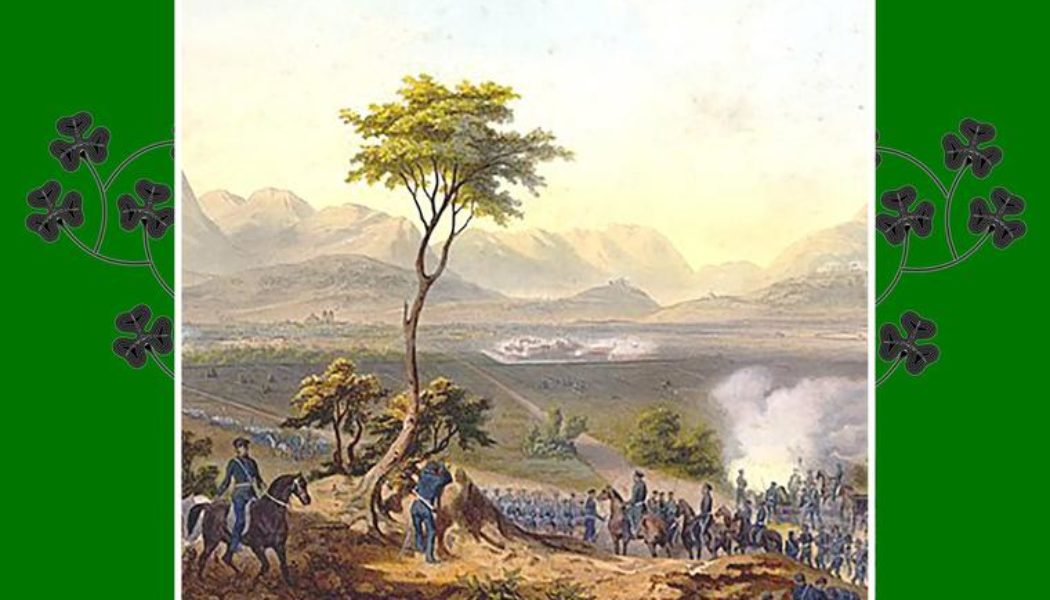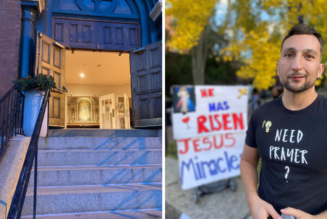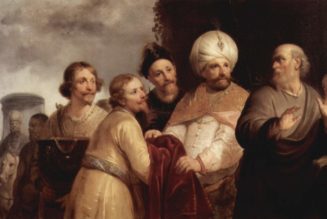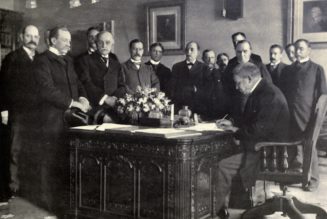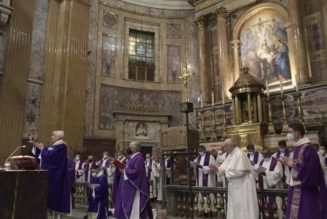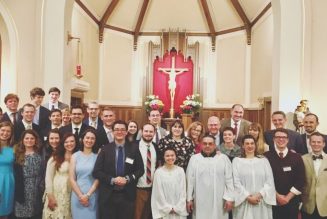
The order to hang them came as they saw their hopes crushed, when the victorious Americans raised the flag above the battle site. They were the second group to die. The first had already been whipped, branded and then hanged for the offense of fighting against the United States.
The Irish Catholic soldiers of El Batallón de San Patricio had left the American army to fight for Mexico in the Mexican-American War — a war of, shall we say, dubious justification. Which is to say, pretty much none.
Americans in favor of the war rationalized it in several ways, Ralph Frasca of Belmont Abbey College explained in the journal Catholic Southwest. They claimed that “Mexico wronged Texan and American citizens, impeded the American ‘manifest destiny’ of expansion, possessed land that pro-slavery forces coveted, or needed political or religious change.” (Catholic Mexico had, by the way, outlawed slavery in 1829.)
Congressman Abraham Lincoln thought the war had been “unnecessarily and unconstitutionally commenced.” Ulysses S. Grant, who fought in the war, later said, “I was bitterly opposed to the measure, and to this day regard the war, which resulted, as one of the most unjust ever waged by a stronger nation against a weaker nation. It was an instance of a republic following the bad example of European monarchies, in not considering justice in their desire to acquire additional territories.”
Fighting Catholics
The St. Patrick’s Battalion was created and led by a soldier named John Riley, an Irish immigrant who had trained in the British army. He gathered a few hundred soldiers (estimates vary), mostly Irish, with some Germans and reportedly Catholics from other countries. He was captured near the end of the war but was not among the 50 soldiers executed. A “D” for “deserter” was branded on his cheek and he was then released.
The soldiers had joined the army or signed up as mercenaries, as immigrants often did as a first step in making their way in a new country. They found themselves not only fighting to take land from another country, but fighting for an army that despised their religion and fighting for it against their fellow Catholics.
The anti-Catholicism of the time was raw. Frasca quotes one editorial published after the war that claimed that Mexico lost because Catholicism was “the festering canker-worm … infecting every organ of vitality and every fibre of strength with the poison of premature rottenness and decay. … No one thinks of keeping his word; no one forbears corrupting his neighbor’s wife or betraying his government; no one …” You get the idea.
The officers were mostly Protestant, and kept the Catholic soldiers from going to Mass and often forced them into Protestant services. The soldiers came from a country that had long been dominated by a more powerful neighbor, whose alien religion was an important tool in its domination of the people. In America, the same culture (basically, white Anglo-Saxon Protestantism) looked down upon them. They knew how it was for the Mexicans.
The Mexican Invitation
The Mexicans shrewdly saw this. Their leader, Gen. Antonio López de Santa Anna, invited them to join the Mexican army. “The Mexican nation only looks upon you as some deceived foreigners, and hereby stretch out to you a friendly hand, offer you the felicity and fertility of their territory,” he said. They would be paid and given land (at least 320 acres), and would be “received under the laws of that truly Christian hospitality and good faith which Irish guests are entitled to expect and obtain from a Catholic nation.”
And, Santa Anna pointed out, they would be serving their fellow Catholics, and not killing them.
“Can you fight by the side of those who put fire to your temples in Boston and Philadelphia?” he asked, which was a very good question. “If you are Catholics, the same as we, if you follow the doctrines of our Savior, why are you seen, sword in hand, murdering your brethren? Why are you the antagonists of those who defend their country and your own God?”
At least some mainstream Americans understood. Congregationalist minister William Jay, son of American founding father John Jay and a man not well disposed to Catholicism, explained the St. Patricks’ reasons for switching sides with some sympathy.
They began fighting as mercenaries, he said, but when they reached Mexico, “discovered that they had been hired by heretics to slaughter brethren of their own church.” The Mexicans told them “in strong language the sin they were committing in fighting against men who had never injured them and who were united with them in a common faith.”
The story’s complicated, of course. We don’t want a Catholic version of the St. Patrick’s Battalion’s story to match the mythology of Disney’s Davy Crockett and John Wayne’s The Alamo (official description: “In 1836, a small band of soldiers sacrifice their lives in hopeless combat against a massive army in order to prevent a tyrant from smashing the new Republic of Texas”).
The soldiers’ motives were certainly mixed. Being Catholic was part of an integrated life, not easily separable from being Irish, or from being poor and oppressed. We don’t know to what extent the soldiers believed the war unjust. They weren’t working out St. Thomas Aquinas’ idea of a just war in relation to American policy. But they did believe they were on the wrong side and they needed to switch.
The Question for the Future
Ambiguous as their example may be, the St. Patrick’s Battalion gives us an example of faithfulness to remember on this St. Patrick’s Day, and one we should use to measure our own faithfulness in facing a state and society in some ways hostile to Catholicism.
When men discover themselves to be serving in an unjust cause, a war brutally prosecuted and with hatred of the Catholic faith, the experience makes stark the fact that their commitment to God is higher than their commitment to their nation.
Dorothy Day raises the same questions in her own way, as a pacifist and anarchist who had as little to do with the state as possible, especially its war-making. She didn’t leave like the St. Patricks did, but she did check out. Day and her colleagues lived in extreme vulnerability to avoid paying income tax that would go to the military. She happily protested in ways that landed her in jail.
The men of the St. Patrick’s Battalion and the men and women of the Catholic Worker movement suggest we have been too at home in Zion. They raise a question on which Catholic social teaching needs to develop. What does it mean to be a citizen? What are its limits and when must we reject it? When, if ever, should we switch sides?
The Limits of Citizenship
Catholic social teaching speaks much about the duties and rights of citizens, and to some extent about the limits to the state’s power over its citizens, and it refers often to the possibility that Catholics will have to say No the state. But it says little if anything about what a citizen is. It never touches the question of if and when we must change our allegiance from one nation to another. It does not consider the conditions under which a Catholic might need to do what the St. Patricks did.
The U.S. bishops’ Forming Consciences for Faithful Citizenship doesn’t realize that it’s a question that needs to be asked. It was written, understandably enough, for a democratic society by people committed to the society’s self-understanding. There were no Dorothy Days on the drafting committee.
There should have been. Catholics on the right and the left see, and in growing numbers, that our relation to the state is more ambiguous and more complicated than American Catholics have understood it to be for a very long time. Whether you see the problem as a government driving “woke” policies or a government using American power to exploit the global south, you see a problem. A state does not have an infinite claim on our allegiance.
The men of the St. Patrick’s Battalion faced the problem in a very stark, direct way, and responded with a decisive “No.” We may not need to say “No,” but we should be saying at least, “Wait a minute” or “Let’s think about this.” It may be that someday the St. Patrick’s Battalion will be seen not just as patriots, but as prophets.
